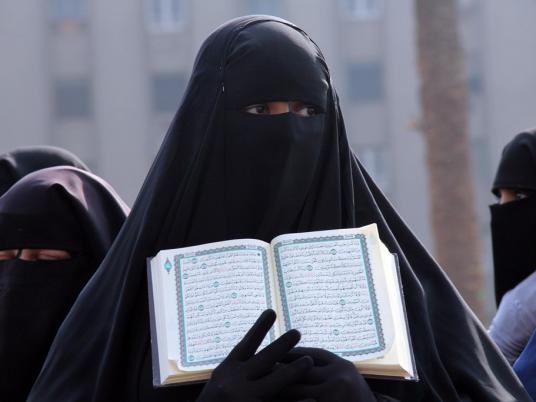Affirming through chants that the revolution is still ongoing, tens of thousands showed up at Tahrir square to demand the speedy and public prosecution of regime figures.
The variety of protesters’ demands was apparent from banners scattered across the square. In addition to trying corrupt figures, protesters primarily demanded reforms to state media, the replacement of corrupt university heads and governors, limited powers of the security apparatus, an independent judiciary, and an end to trying civilians in military tribunals.
Main demands specified by the protests’ organizers – such as drafting a new constitution before the parliamentary elections and creating a presidential council to replace the ruling military council – were more controversial.
Khaled al-Sayyed, member of the Youth of the Revolution Coalition, addressed the crowd concerning the public prosecution’s referral of Mubarak to criminal court on Tuesday. He credited the protests planned for Friday with bringing about the move. “The day succeeded before it started, they were scared of it,” he said.
While some protesters supported the demand of a presidential council to take over the government, most only aimed to put pressure on the military council into meeting their demands.
Hesham Fouad, an engineer in his mid twenties, came to the square with his friends to protest neglect of those injured during the revolution, corruption within the Ministry of Interior, and the lack of a law that enables people to file lawsuits against regime figures for corruption.
Even though he took part in the protest, Fouad joined many others in rejecting demands of a presidential council and drafting a new constitution prior to parliamentary elections.
Fouad shares the opinion of many who called against the protest, saying that demanding a new constitution goes against democratic principles after over 70 percent voted yes to amending the current constitution in the March referendum.
“If we start the practice of rejecting the results of democratic elections then we will never reach democracy,” argued Fouad.
Public figures took to the stage to stress certain demands. Judge Mahmoud al-Khodeiry asked for new measures to ensure the independence and integrity of the judiciary, claiming that “the revolution hasn’t reached the ministry of Justice yet.”
Karima al-Hefnawy, Kefaya movement member, demanded the exclusion of the former NDP members from upcoming elections and a change of state media heads. She also tried to dissuade some participants of ambitions to launch a second revolution and maintain an open-ended sit-in.
“Our revolution is not over. So that we start a second one, we are here with our original demands. Well protest from 1 to 6 and if the demands aren't met, we'll come back next week,” said Karima.
Former member of the parliament Gamal Zahran proposed creating an independent judicial board to realize one of the crowd's most pressing demands, a speedy and fair trial of regime figures.
Protesters’ chants conveyed that they would not allow the revolution’s martyrs to have died in vain, and they are ready to face the same fate as them in order to attain the revolution’s demands.
The military council issued a statement Thursday announcing that it would not be present near the square to avoid attempts to create friction between the military and protesters. Protesters therefore created popular committees securing all entrances to the square.
Eye-witnesses report that the popular committees were able to repel an attack by armed thugs who attempted to enter the square by car early Friday morning.
The day’s name “second day of anger” caused some people to fear that the chaos which occurred on 28 January, the first day of anger that marked a major escalation in recent unrest, would erupt once more. Hospitals went on high alert in anticipation of violent outbreaks.
The Muslim Brotherhood rejected the protests in a statement issued on Wednesday, while most political powers including the Youth of the Revolution Coalition, the Kafeya Movement for Change, the Baradei campaign, the National Association for Change, the April 6 Youth Movement, the Democratic Front Party, the Free Egyptians Party, the Egyptian Social Democratic Party announced their participation in the protest while rejecting calls for a new sit-in.
A group of activists, whose political affiliations remain unknown, are still planning to reignite the 18-day revolution by following up the protest with a new open-ended sit-in intended to continue until their demands are met.
Additional reporting by Rana Khazbak

